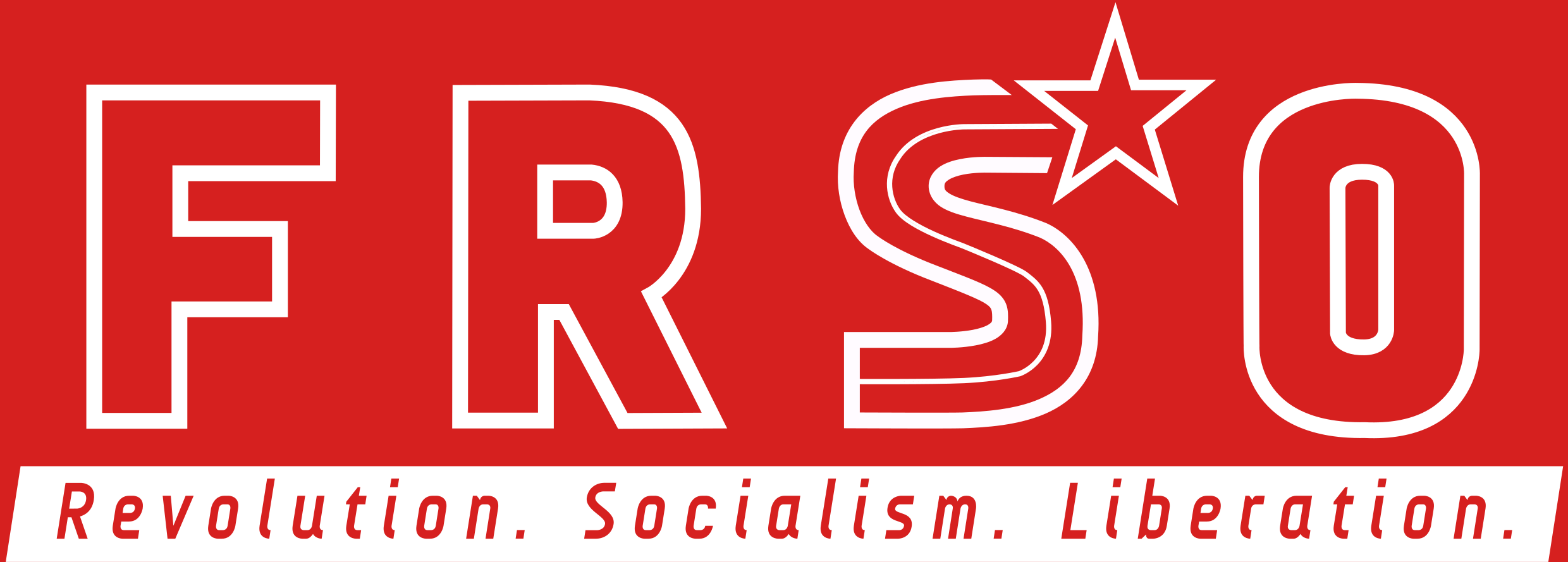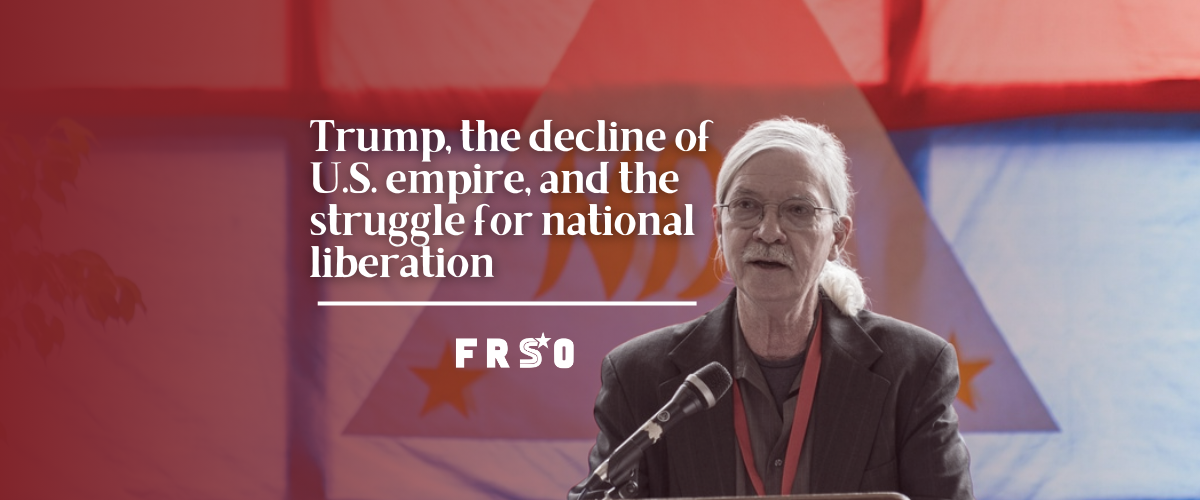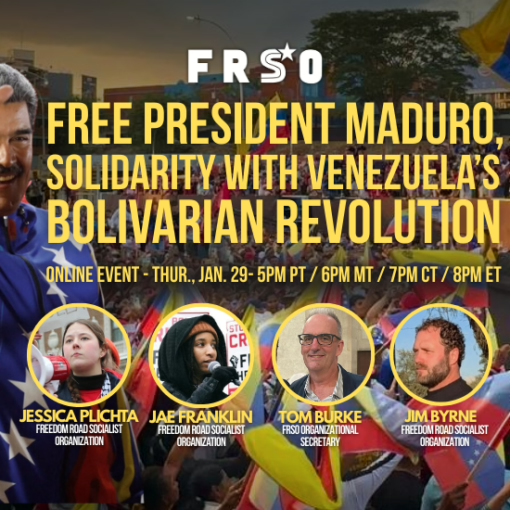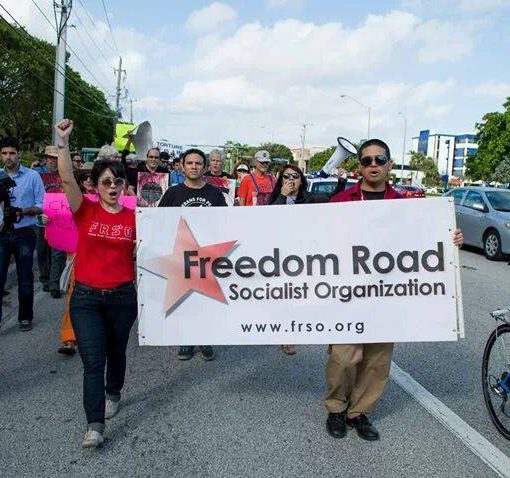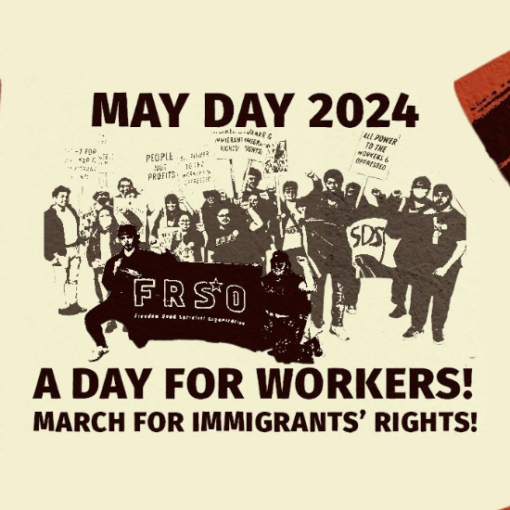By Mick Kelly, Freedom Road Socialist Organization
Comrades and friends:
On behalf of the Central Committee, and indeed the entire membership of Freedom Road Socialist Organization, we thank the National Democratic Front of the Philippines and its member organizations for organizing this important conference. We salute all of you who are gathered here. Having a developed understanding of imperialism and national oppression, as well as the fights for national liberation, is vital for understanding the world as it is and what one needs to do to change it. This conference will no doubt further this end.
Trump and the decline of U.S. imperialism
The election of Donald Trump to the presidency of the U.S. is symptomatic of a monopoly capitalist power in decline. His return to power reflects a failure of the other party of monopoly capitalism (the Democratic Party of Biden/Harris) and its inability to address the needs and aspirations of the working class. Drawing from a toxic brew of national chauvinism and reactionary currents of all kinds, Trump’s return to the White House will signal the sharpening of a host of contradictions domestically and internationally.
Trump has referred to himself as “Tariff Man,” promising to slap 20% tariffs on all imports and substantially more – 100 or 200% – on things like electric vehicles from China. The people around him, like some of the Biden crowd, look towards “delinking” the U.S. economy from the People’s Republic of China.
In his outstanding work, Imperialism: The Highest Stage of Capitalism, Lenin made the point that one of the features of imperialism, of decaying monopoly capitalism, was that big capital finds it increasingly difficult to utilize science and holds back advances in the productive forces. This phenomenon is on full display in the U.S., where someone like “vaccine skeptic” RFK Jr will be put in charge of public health, and where industrial policy is turning against technologies that cause less harm to the environment, such as electric vehicles.
The role of the U.S. in the world economy is shrinking. In 1960 the U.S. had about 40% of the world GDP. Today it is about half that. There was a day when U.S. imperialism championed free trade. For the past decade-plus, Washington DC has moved away from the neoliberal trade model, erecting a growing tariff blockade. The abandonment of the Trans-Pacific Partnership and paralysis of the World Trade Organization are signs of things to come.
After World War II, the United States constructed a web of economic intuitions where Wall Street and Washington DC occupied center place. That world is gone, and it has been replaced by a fragmenting world economy, where the decline of U.S. imperialism is picking up speed. Trump will accelerate the process.
One of the symptoms will be a sharpening of inter-imperialist contradictions, which will have political and military dimensions. For example, Trump’s view of the Ukraine is that it is mainly a concern of Europe and that too much U.S. time and treasure has been wasted on it. If implemented as policy, this shift on the Ukraine will force the European imperialist powers, especially Germany, to carry out a military buildup while putting new stress on NATO.
What we are seeing is clearer definition in the developing spheres of influence and domination – where the U.S. has a smaller role to play. Also worth noting is that the two other monopoly centers of monopoly capitalism, i.e. Japan and the European Union, are also producing a smaller share of the world GDP.
People vs. imperialism
The principal contradiction in the world today is between the peoples, nations and countries of the developing world versus imperialism. The U.S. is presently the principal imperialist power, and as such, it is the main danger to the world’s peoples. From Puerto Rico to the Philippines and Palestine, people are rising up and fighting for liberation.
The battle taking place in the Middle East is vital to the world revolutionary process in the current period. On one side you have Western imperialism, Zionism and Arab reaction. On the other, we have the heroic resistance of Palestine and Lebanon, and a whole axis of resistance, which encompasses Yemen, Syria and the popular forces of Iraq and Iran. This is a battle of world historic importance.
The U.S. cannot continue to exist as a world empire without dominance of the Middle East, and this fact explains why the bond between imperialism and Zionism is so strong. The broad masses of people throughout the Middle East hate foreign domination and want it to end. Israel is the cop on the beat for Western imperialism, a reliable nightstick that can be used against those who want freedom and independence. This means that Trump will double down on the Gaza genocide facilitated by Biden/Harris.
It is also worth noting that things can turn into their opposite, that Israel can move from being an asset to a liability: if the genocide and carnage in Palestine and Lebanon provoke uprisings in the Arab world, the position of imperialism will be impacted.
The fact that many of the forces fighting imperialism and Zionism are not led by the working class does not change the revolutionary, anti-imperialist nature of the struggle that is taking place. Stalin, an outstanding Marxist-Leninist and pathbreaking theorist on national question, wrote in the great work, The Foundations of Leninism:
“The struggle that the Emir of Afghanistan is waging for the independence of Afghanistan is objectively a revolutionary struggle, despite the monarchist views of the Emir and his associates, for it weakens, disintegrates and undermines imperialism; whereas the struggle waged by such ‘desperate’ democrats and ‘Socialists,’ ‘revolutionaries’ and republicans as, for example, Kerensky and Tsereteli, Renaudel and Scheidemann, Chernov and Dan, Henderson and Clynes, during the imperialist war was a reactionary struggle, for its results was the embellishment, the strengthening, the victory, of imperialism.”
That said, the struggle for working class leadership in the movements for national liberation is important, and as communists we have the responsibility to support other communists who are contending for leadership in the national movements – be it in Palestine or anywhere else.
Marxism-Leninism and the fight for national liberation
In an environment of declining imperialism, there are some important things to keep in mind.
First, there needs to be a strategic alliance, a “union” as Lenin put it, between the working class in the advanced capitalist countries, and the broad masses of the oppressed in the developing countries. There are hundreds of millions of people in rural areas locked in semi-feudal property relations, which in part provides the material conditions for people’s war.
Second, while there has been a resurgence of the communist and national liberation movements, party building and the construction of revolutionary, communist organizations is a vital task in the present period. Ending, or breaking free of imperialism is not easy, and to successfully do so over the long run requires organizations that embody the theory and practice of Marxism-Leninism. Building a new communist party should be the central task of revolutionaries in the U.S., and great progress is being made on this front.
Third, national liberation movements which weaken imperialism are objectively progressive and will hasten imperialism’s end. Self-determination of oppressed nations is a democratic demand, and, to the extent and degree that the fight for self-determination weakens imperialism, those fights should be supported. This has an application in multinational states, including the U.S.
Fourth, monopoly capitalism is a law-governed system where the drive to seek the highest rate of profit is basic. While capitalism is always incapable of genuine long-range planning, imperialism in decline is animated by the shortest of short-term gain and contingency. One of the things that makes the Trump administration dangerous is precisely a reactionary pragmatism that is reshaping the U.S. empire. It is a recipe for more wars and intervention, particularly in Latin America and the Pacific.
Finally, we need to be proletarian internationalists who are serious about uniting the working and oppressed people of the world. Looking around this room, that is exactly who we are. Mao made the point that imperialism is strategically a paper tiger. He was right – in the short term imperialism is an “iron tiger,” it is dangerous. In the long run it will certainly be defeated.
Long live proletarian internationalism!
Long live the unity of the people of the world!
Long live the unity of working and oppressed people – we have nothing to lose but our chains!
